Dysfunctional T cells can render the immune system unable to eliminate infections and cancer. Therapeutic targeting of the surface receptors that inhibit T cell function has begun to show remarkable success in clinical trials. In this Review, we discuss the potential mechanisms of action of the clinical agents that target two of these receptors, programmed cell death protein 1 (PD1) and lymphocyte activation gene 3 protein (LAG3). We also suggest correlative studies that may define the predominant mechanisms of action and identify predictive biomarkers.
Via Krishan Maggon



 Your new post is loading...
Your new post is loading...

![Clinical blockade of PD1 and LAG3 [mdash] potential mechanisms of action : Nature Reviews Immunology : Nature Publishing Group | Immunology and Biotherapies | Scoop.it](https://img.scoop.it/Z7M6OcSPx7hB-JNuLC7aKjl72eJkfbmt4t8yenImKBVvK0kTmF0xjctABnaLJIm9)







